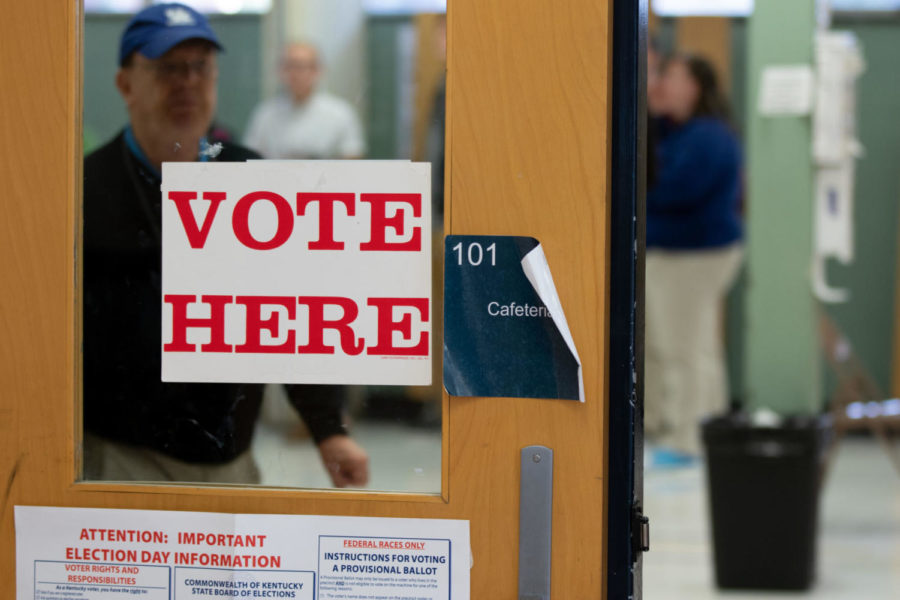Proposed bill would allow Kentucky minors to vote in local elections
A “Vote Here” sign outside of the Maxwell Elementary Voting location. Voters came out early in the morning to vote in the midterm elections on Tuesday, Nov. 6, at the Maxwell Elementary Voting location in Lexington, Kentucky. Photo by Michael Clubb | Staff
January 16, 2019
This year, Kentucky lawmakers will consider amending the state’s constitution to allow 16 and 17-year-olds the right to vote in local elections.
The bill in question was pre-filed in 2018 by Democratic Senator Reggie Thomas of Lexington. The bill would allow minors to vote in school board and local elections, such as Lexington’s recent mayoral race.
If passed, Kentucky would become the first state to grant suffrage to minors. However, it would not be unprecedented for the state to pave the way in voting age reform; in 1955, Kentucky became the second state to lower the voting age from 21 to 18, preceded only by Georgia.
According to Thomas, it would be fitting for Kentucky to lead the way on this issue once more, in light of minors’ growing responsibilities.
“I think Kentucky should take the lead again and say, ‘we should move it to 16,’” Thomas said. “After all, at 16, we give young people the right to drive, and that’s a lot of responsibility. At 16, you can also apply to become an emancipated minor, you can take control of your own life.”
Although Kentucky would be the first state to adopt the change, a few cities in the U.S., such as Berkley, Calif., already allow minors to vote in local elections.
Recently, lawmakers in Maryland have considered similar changes to the state constitution, and legislators in the District of Columbia have even considered granting 16 and 17-year-olds the right to vote in general elections.
Attention to minor’s suffrage has increased in the wake of rising youth-led political advocacy. Notably, several students at Marjory Stoneman Douglas High School in Parkland, Fla., have spoken publicly about gun reform after 17 students were killed at the school in a mass shooting nearly a year ago. This has influenced teenagers across the U.S. and in Kentucky to address national and local issues.
Dunbar student Parker Smith, for example, compared the advocacy of Parkland students to protests undertaken by several Kentucky students in response to pension reform.
“For children, there is no… compelling reason [for denying the right to vote], besides a generally accepted assumption that children are not yet mature enough to cast an informed vote,” Smith said in an op-ed for the Herald-Leader. “But aren’t they? Didn’t they just accompany teachers in Frankfort, protesting a bill that would hurt the public education system in our state?”
Joshua Douglas, a UK law professor specializing in election law, has also written of the benefits of lowering the voting age. He argued that voting – and not voting – is “habit-forming.”
“Eighteen is a tough time to begin the habit of voting. Many people are moving away from home to a new community and entering the workforce or starting school,” Douglas said. “Sixteen, however, makes a lot more sense, as these individuals are still in the supportive environment of home and school.”
According to Douglas, lowering the voting age is only one important solution for increasing voter turnout. Other reforms include changes to the voter registration and absentee ballet process, as well as a focus on education.
“If we lower the voting age to 16 and couple that with improved civics education, we can create a new generation of lifelong voters,” Douglas said.
Thomas also stressed the importance of a civics education but suggested that recent legislation in Kentucky has already improved students’ understandings of the political process. He referenced legislation passed in 2017 that requires all Kentucky high school students to pass a citizenship test before graduating.
“We’ve gotten to the point where students take that test and pass it in Kentucky,” Thomas said. “That’s a step in the right direction for emphasizing students’ education. But nothing is more important in students’ education than giving people the right to vote. That’s the ultimate act of accountability.”
Although the bill to lower the voting age in Kentucky will be considered during the 2019 regular session, Thomas said the process of constitutional amendment would likely delay its passing until 2021 or 2022.
In the event of mixed support in the General Assembly, Kentucky voters may even see the matter of minor’s suffrage brought before them during the 2020 general election.
Thomas said that he’d like to bring the question to the voters, ultimately. But, as a legislator, his mind is made.
“If a 16-year-old can drive,” Thomas said, “a 16-year-old can vote.”
































































































































































